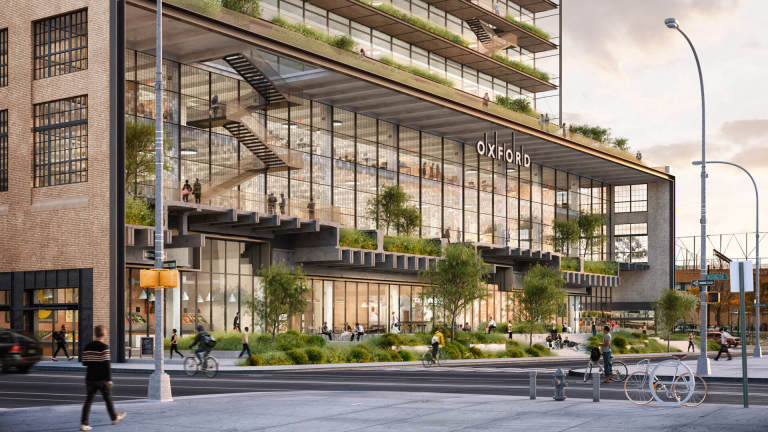Groundbreaker Profile
Angie Simon
Retirement hasn’t stopped this former CEO and president from making an impact on the next generation of construction
“A career in the trades is the best-kept secret.”

Angie Simon
Co-Founder & President
Heavy Metal Summer Experience
Give us the rundown — what’s the Heavy Metal Summer Experience (HMSE)?
It’s a summer camp for high schoolers that we started in our shops. At Western Allied, we ran a summer camp the first year in our shop to teach high schoolers about the trades. We taught them about sheet metal, about piping, let them have their hands-on, let them use fire and weld and solder and teach them that a career in the trades is the best-kept secret. We’ve just continued to grow since that first summer, and it seems to be really exploding, which I’m excited about. We’re starting to see a lot of these kids get into our trades, joining as an apprentice in sheet metal or piping.
How did HMSE get started?
There was my company, Western Allied, and my peer group company, Hermanson. When we started talking about this, I came up with the idea, “Let’s have a summer camp.” I wrote up a business plan and presented it to my partners, who were very on board and said, “Let’s do this.” When Rick Hermanson heard about that, he said, “We’d like to join you.” So the two companies came up with ideas about what projects we wanted to do, came up with ideas on release forms, permission slips and all the logistics. We threw the first camps in the summer of 2021 with 28 kids total up in both Seattle and in the Bay Area, and they just went really well.
Where did HMSE go from there?
We decided we should write a playbook because we wanted to share the idea with other contractors. At that point, I was also the national president of SMACNA, so I was able to go around and talk to contractors and throw a challenge out to them, saying, “We all talk about workforce development and how we’re gonna lose all these people that are retiring in the next five years, but we’re not doing anything about it.” So I said, 'Here's a playbook, I’ll offer that to you, offer to help you, but you need to step up and actually do something about it.’ So we decided to form HMSE as a nonprofit and work with a lot of amazing partners like Milwaukee, DeWalt and Procore. A lot of great partners help us sponsor tool bags and Red Wing boots for the kids. Then we’re helping run camps – going from two camps and 28 kids the first summer to 11 camps and 170 kids, and this past summer, we had 21 camps and 325 students. In the summer of 2024 we have 41 locations across the US and Canada with approximately 400 studentsI — it’s so exciting.

Why do you feel it’s important to be a part of HMSE, even after retiring?
HMSE is my passion, and because of retirement, I now have the time to pursue this passion. I’m not sure I was fully ready to retire. I love this industry, but was ready to retire from running a company and now can be very actively involved in the industry. I think I’m making a difference, adding kids to the industry. I can continue to mentor, facilitate peer groups, participate in multiple SMACNA committees, and continue to be the chair of Women in Construction, but HMSE just kind of puts it all together. It’s a great project that I think we will need for the next 10 years because we need to tell the story of what an amazing industry this is and what an amazing career opportunity it is for kids to be able to get into the trades.
How does the program help the next generation best support the construction industry?
This program is helping advertise what a great career the trades is in construction. We’re posting on social media; we’re helping kids see that this is an amazing career. I’ve also heard that about a third of kids who graduate high school right now are going to four-year colleges. That’s not a lot. So we need to find those other two-thirds and share what they can do in construction. I think construction needs to make sure that we change the dynamic and change the story of what construction looks like and sell it to the next generation, as well as their parents and teachers, to show that it’s a really viable career.
How do you feel HMSE is making that difference?
We’re already seeing the changes that HMSE is making. A counselor from La Verne School District called me. She had three kids that went into the camp in the summer of 2022. One of those kids was the superintendent of the school’s daughter. She said the kids loved it so much that she wants to put 12 more kids in there. She also said that she wanted to become a counselor for alternate careers, and her school district decided they would make her that counselor. So that’s what we need to change — the idea that a counselor is only teaching kids about how to get to college because there are other opportunities, and college is not for everyone. You can have an amazing career, and many people who start in the trades end up owning and running companies.

What does successful completion of the program look like?
The program is free for students, and on the very first day, they get a set of Red Wing boots for safety. We give them their PPE, donated from either Milwaukee or DeWalt. Over the course of the camp, they perform between 25 and 30 hours of hands-on skills. They might make a dustpan or a toolbox of sheet metal. They might make a lamp or a clock out of copper. One camp in Michigan, make a barbeque for the kids to take home. We’re teaching them how to make things with their own hands.
Even if they don’t end up going into the trades, they’ve learned a skill. They’ve learned how to measure things, solder and weld. When they graduate from the camp, they get a certificate and a medal, but they also have confidence now — they’ve learned about the opportunities in the unionized apprentice trades. For every six kids who graduate and are out of high school, we see four or five of them who want to get into the trades, so we’re doing pretty well with the numbers. We invite employees, city officials, business managers and agents to come to graduation and make it a big deal. Sometimes, the kids even get offered an internship after graduating.
How is HMSE helping those currently in construction who may be near retirement?
The instructors that lead the individual HMSE camps are generally part of the generation who will be retiring in the next five years or volunteers that have retired — unionized sheet metal or pipefitters or electricians – and they love to share their trade. We’re sharing with the past generation that there are kids who want to do this; they want to work hard and make things. An instructor who is one year away from retirement will say, “I wanna do this for the next five years; I wanna volunteer my time because it’s really fun to see how excited the kids are.”
What kind of role does technology play in the program for the next generation?
The technological changes in construction over the last five years have been so amazing. We actually team up apprentices with senior foreman that aren’t great with technology and those apprentices are helping the foreman. When we show these kids 3D BIM modeling, how to lay out points and how robotics is a part of construction, they get so excited. They’re joining the industry at a really fun time right now. The next generation is going to drive technology and insist on it — they were born with a phone in their hand. So if we don’t accept technology, they’re gonna leave the industry.

What was the culture like in construction when you first started, and how has it changed since then?
I started in construction 38 years ago as an engineer out of college, with the title of project manager. I could tell you some interesting stories out at jobsites or meetings. I had issues with superintendents telling me I couldn’t come in the trailer and that they don't do girls in the trailer — even though I was the project manager. Inspectors wouldn’t let me walk them through a job because they thought I was a secretary. Women in the trades have had to deal with even more harassment. I was lucky to be at a company that was really inclusive, and never felt like I didn’t belong there. Construction has changed a lot since then, and we’re starting to see a lot more women and minorities as well.
What was technology like when you first started in construction?
My very first job at a small contractor was about a year before I started at Western Allied. About five months into that job, we got a fax machine. Bids would be due at 10:00 at the general contractor's office. Before the fax machine or email, you would have to drive to the general contractor’s office area, go to a 7-Eleven, get on the payphone and call 10 minutes before it was due, and I’d write the price of the bid in the proposal. Then, I’d seal it and deliver it to the general contractor. So, the fax machine was a game-changer because now we could do the same thing and just fax it to them. I’ve seen technology change — we used to draw by hand, and then all of a sudden, we’re using BIM and emails. Now, everything’s faster and faster, and we’re starting to see technology really help streamline things — Procore, for example. I’m very excited that venture capitalists are investing in construction tech because they feel it’s being adopted.
What does passing the torch mean to you?
It means that the knowledge I have gained over 35 years at Western Allied, I feel obligated to share with the next generation. I call this the third portion of my life, and I feel now, in this portion, I can give back even more because I’ve done and learned a lot. I spent a lot of time mentoring young leaders at Western Allied, having one-on-ones every month. I want to be able to make a difference for the next 20 years. Construction needs to pass the torch because it’s really important to take the knowledge of those who are retiring and share it with the next generation.






